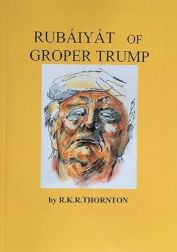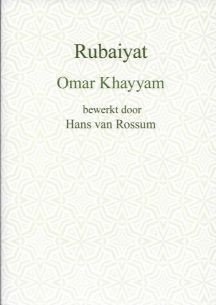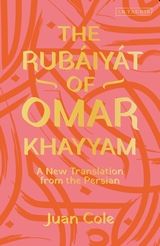Rubaiyat of Groper Trump. R.K.R. Thornton. Exeter : Rectory Press, 2020. 65 p.
293 quatrains
An angry collection of Rubaiyat (quatrains in Fitzgerald’s Omar Khayyam form) castigating President Trump, his Republican enablers, and all his disgraceful crew. The sharpest attack since Dryden and Swift, it mixes wit, comedy, and annoyance. (From Amazon)
Omar Chajam. Eva Pietzcker. Bayreuth : Bear Press Benda, 2020. 2 l.; 30 cm.
Title on front cover: Fünf Rubajat [by Friedrich Rosen]. Einblattdruck CLXXXII der Bear Press Wolfram Benda in der Lutetia. Bayreuth 2020.
Rubaiyat. Omar Khayyam. Bewerkt door Hans van Rossum. Giethoorn, Duine, 2020. – iv, 144 p.; 15,5 x 11 cm. – ISBN: 978-90-79726-17-2.
144 quatrains.
Selection from a translation published online in 2003. – 75 copies
– Inleiding
– Rubaiyat
The Rubáiyát of Omar Khayyám. A new translation from the Persian based on the edition of Mahmud Yerbudaki with a historical epilogue by Juan Cole. London ; New York [etc.] : I.B. Tauris, 2020. – viii, 164 p.; 21 x 13 cm. – ISBN: 978-0-7556-0052-6.
157 quatrains
Contents
– Acknowledgements, p. vi
– Introduction, p. 1
– Rubáiyát, p. 19
– Epilogue: Persian Literature and the Rubáiyát, p. 71
– Notes, p. 149
– Index, p. 161
Edward FitzGerald’s Translation of The Rubáiyát of Omar Khayyám: The Appeal of Terse Hedonism. Asghar Seyed-Gohrab
In: Seigneurie (Ed.) 2020 – A Companion to World Literature. Volume 4: 1771 to 1919. 6 volumes. Hoboken, Wiley. Pp. 1-12
Abstract
The year 1859 is a seminal moment for both Persian and English poetry. In that year, the English poet Edward Purcell FitzGerald (1809–1883) published an adaptation of the quatrains attributed to the Persian philosopher poet Omar Khayyam, under the title The Rubáiyát of Omar Khayyám, the Astronomer-Poet of Persia. It was to become one of the world’s best-known poems. Although several poets before FitzGerald had translated specimens of Persian literature into English, his translations transmitted the Persian sentiments into English poetry, and have remained popular in world literature ever since. At first the translation was not successful at all, as the history of the first edition indicates. The book contained 75 quatrains and was published anonymously in an edition of 250 copies, 40 of which were bought by FitzGerald himself. With this poor start, the remaining books were sent to Bernard Quaritch’s bookshop, where they were shelved and later placed in a box outside the door for sale. In 1861, Whitley Stokes and John Ormsby discovered the book. Stokes purchased copies of the Rubáiyát for his friend Dante Gabriel Rossetti, who introduced the book to the Pre-Raphaelite circle. Its enthusiastic reception among the Pre-Raphaelites led FitzGerald to publish a second edition of the Rubáiyát in 1868 to which he added 35 quatrains. The cult of Rubáiyát was born. The Rubáiyát ran to a third edition in 1872, a fourth in 1879, and a fifth, posthumous, edition in 1889 (Karlin 2009, l–lvi). FitzGerald’s quatrains have been the source for hundreds of translations in various languages. Some 310 editions have sold millions of copies around the world.



